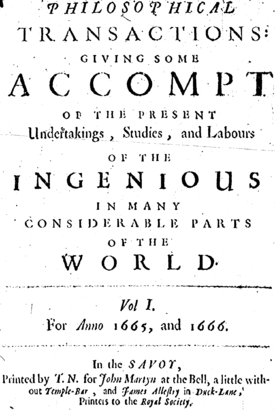Philosophical Transactions of the Royal Society of London
- Philosophical Transactions of the Royal Society of London
-
Philosophical Transactions of the Royal Society
The Philosophical Transactions of the Royal Society, ou Phil. Trans., est une revue scientifique publiée par la Royal Society de Londres. Apparue en 1665, juste après le Journal des sçavans, c'est la deuxième revue scientifique au monde par ordre d'ancienneté et la première par ordre de longévité.
Historique
Le premier numéro a été publié par Henry Oldenburg en 1665, six ans après la fondation de la Royal Society. De nombreuses découvertes majeures y ont été publiées, et elle a compté parmi ses contributeurs Isaac Newton, Michael Faraday et Charles Darwin. En 1672, la revue publie le premier article d'Isaac Newton, New Theory about Light and Colours, qui peut être considéré comme le début de sa carrière scientifique.
Format actuel
De nos jours, la revue est constituée de deux séries, A et B, couvrant les mathématiques, la physique et l'ingénierie d'une part, et la biologie d'autre part. Les livraisons sont constituées de numéros thématiques ou portant sur un congrès scientifique. Les articles portant sur des travaux de recherche sont publiés dans une revue associée, les Proceedings of the Royal Society.
Voir aussi
Liens externes
 Portail de la presse écrite
Portail de la presse écrite
Catégories : Revue pluridisciplinaire | Titre de presse créé en 1665
Wikimedia Foundation.
2010.
Contenu soumis à la licence CC-BY-SA. Source : Article Philosophical Transactions of the Royal Society of London de Wikipédia en français (auteurs)
Regardez d'autres dictionnaires:
Philosophical Transactions of the Royal Society — The Philosophical Transactions of the Royal Society , or Phil. Trans. , is a scientific journal published by the Royal Society.Begun in 1665, it is the oldest scientific journal printed in the English speaking world and the second oldest in the… … Wikipedia
Philosophical Transactions of the Royal Society — Titelblatt der ersten Ausgabe Philosophical Transactions., herausgegeben 1665 Die Philosophical Transactions of the Royal Society, oder kurz Phil. Trans., ist eine wissenschaftliche Fachzeitschrift herausgegeben von der britischen Royal Society.… … Deutsch Wikipedia
Proceedings of the Royal Society — Infobox Journal title = Proceedings of the Royal Society discipline = Natural Sciences abbreviation = Proc. R. Soc. A and Proc. R. Soc. B publisher = The Royal Society country = United Kingdom Proceedings of the Royal Society is the parent title… … Wikipedia
Royal Society of London — Royal Society Le bâtiment de la Royal Society à Londres. La Royal Society, dont le nom officiel est Royal Society of London for the Improvement of Natural Knowledge et que l on peut traduire par Société royale de Londres, est une institution… … Wikipédia en Français
Royal Society of London — Gebäude der Royal Society in London Gebäude der Royal Society in Edinburgh … Deutsch Wikipedia
ROYAL SOCIETY OF LONDON — incorporated by royal charter in 1662, but owing its origin to the informal meetings about 1645 of a group of scientific men headed by Theodore Haak, a German, Dr. Wilkins, and others; in 1665 the first number of their Philosophical… … The Nuttall Encyclopaedia
Royal Society — The Royal Society of London for the Improvement of Natural Knowledge, known simply as The Royal Society, is a learned society for science that was founded in 1660 [cite web |url=http://royalsociety.org/page.asp?id=1058 |title=History of the Royal … Wikipedia
Royal Society — Zweck: Wissenschaft und Forschung Vorsitz: Paul Nurse Gründungsdatum … Deutsch Wikipedia
Fellow of the Royal Society — Royal Society Le bâtiment de la Royal Society à Londres. La Royal Society, dont le nom officiel est Royal Society of London for the Improvement of Natural Knowledge et que l on peut traduire par Société royale de Londres, est une institution… … Wikipédia en Français
Royal Society (of London for the Promotion of Natural Knowledge) — Oldest scientific society in Britain. Founded in 1660, its early members included Robert Hooke, Christopher Wren, Isaac Newton, and Edmond Halley. It provided an impetus to scientific thought and developments in England, and its achievements… … Universalium
 Angleterre
Angleterre
